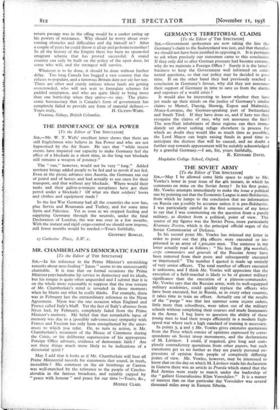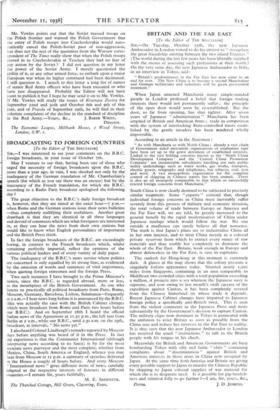THE SOVIET ARMY
[To the Editor of Tim SPECTATOR] Sza,—May I be allowed some little space to reply to Mr. Vowles's letter in your issue of the 4th instant, in which he comments on mine on the Soviet Army? In his first point, Mr. Vowles attempts immediately to make the issue a political one by pointing out that the Economic League is anti-Bolshevist, from which he jumps to the conclusion that no information on Russia can possibly be accurate unless it is pro-Bolshevist. I was particularly careful in the first sentence of my letter to say that I was commenting on the question from a purely military, as distinct from a political, point of view. The source of my figures was the Soviet Press, more particularly Krasnaia Zvezta, which is the principal official organ of the Soviet Commissariat of Defence.
In his second point Mr. Vowles has misread my letter in order to point out that 384 officers , were executed or im prisoned in an army of 1,300,000 men. The sentence in my letter actually read as follows : "No less than 384 marshals, corps commanders and generals of the Russian Army have been removed from their posts and subsequently executed or imprisoned." The number I quoted is made up entirely of very senior officers. The total number of officers executed is unknown, and I think Mr. Vowles will appreciate that the execution of a field-marshal is likely to be of greater military significance than the execution of a platoon-commander. Mr. Vowles says that the Russian army, with its well-equipped military academies, could quickly replace the officers who have been executed, but in Russia, as in every other country, it takes time to train an officer. Actually one of the results of the " purge " was that last summer some io,000 cadets, little more than schoolboys, were taken out of the military schools without completing their courses and made lieutenants in the Army. I beg leave to question the ability of these young men to lead their troops efficiently in a modern high- speed war where such a high standard of training is necessary.
In points 3, 4 and 5 Mr. Vowles gives extensive quotations from the Press which consist of opinions expressed by corre- spondents on Soviet troop movements, and the declarations of M. Litvinov. I could, if required, give long and com- pletely contradictory quotations from other papers, but such statements get us no further as they are purely personal ex- pressions of opinion from people of completely differing points of view. Mr. Vowles, however, may be interested to know that on the day on which M. Litvinov made his declaration in Geneva there was an article in Pravda which stated that the Red Armies were ready to march under the leadership of the "gallant Generalissimo Klim Voroshilov." It is a matter of interest that on that particular day Voroshilov was several thousand miles away in Eastern Siberia.
Mr. Vowles points out that the Soviet massed troops on the Polish frontier and warned the Polish Government that the entry of Polish troops into Czechoslovakia would auto- matically cancel the Polish-Soviet pact of non-aggression, but does not the rest of the quotation from the Warsaw corre- spondent of The Times really show that when the Polish troops moved in to Czechoslovakia at Teschen they had no fear of any action by the Soviet ? I did not question in my letter the power of the Soviet Army. I merely questioned the ability of it, or any other armed force, to embark upon a major European war when its higher command had been decimated. I still question it. I attach to this letter a long list of names of senior Red Army officers who have been executed or who have just disappeared. Probably the Editor will not have room to publish it but I hope he may send it on to Mr. Vowles. If Mr. Vowles will study the issues of Krasnaia Zvezta for September 22nd and 30th and October 6th and 9th of this year, and of Pravda of September 29th, he will find in their columns complaints of the decline in the standard of discipline
in the Red Army.—Yours, &c., J. BAKER WHITE,
Director.
The Economic League, Millbank House, 2 Wood Street, London, S.W. r.











































 Previous page
Previous page